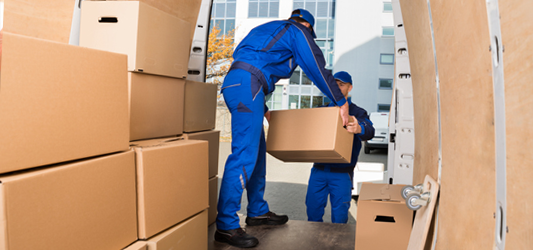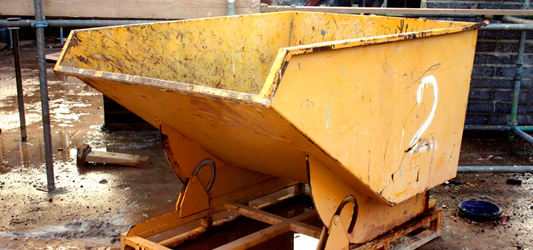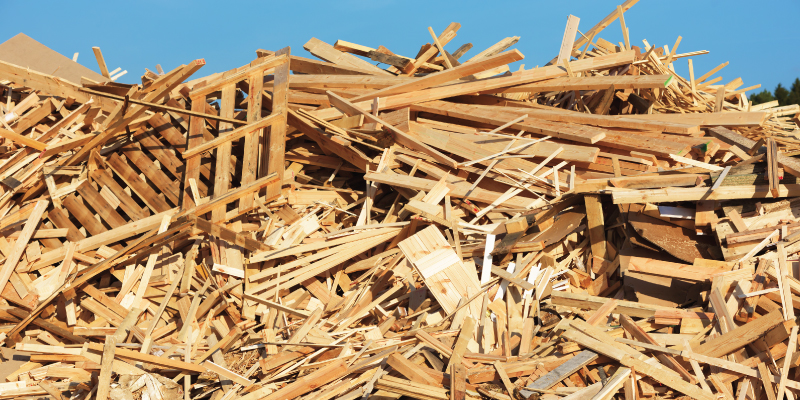
Updated December 21, 2023
Demolition is an inevitable part of positive change and growth, whether it's interior, structural, residential, commercial, a single home, or an entire shopping center.
Demolition makes way for new developments, addresses safety concerns, and helps with repurposing existing spaces, and as such, is a crucial aspect of urban planning and development. However, in an era where sustainability is at the forefront, it is imperative to explore methods that not only efficiently clear spaces but also minimize environmental impact.
This article delves into how to maximize recycling and salvage opportunities in your demolition project, showcasing innovative approaches and strategies that contribute to a more sustainable future.
Table of Contents:
- Understanding the Impact of Demolition
- Common Recyclable Demolition Debris
- Advantages to Recycling and Salvaging Demolition Debris
- Strategies for Maximizing Recycling and Salvage Opportunities
- Case Studies in Sustainable Demolition
Find demolition contractors near you
Understanding the Impact of Demolition
Traditional demolition methods often involve the use of heavy machinery to bring down structures, resulting in a significant amount of waste.
The debris generated from demolition projects can range from concrete and metal to wood and other materials, contributing to the mounting challenge of waste management.
To address this issue, the construction and demolition (C&D) industry is increasingly turning towards recycling and salvage practices, specifically deconstruction, to increase the amount of debris that is salvaged during a demolition project.
Common Recyclable Demolition Debris
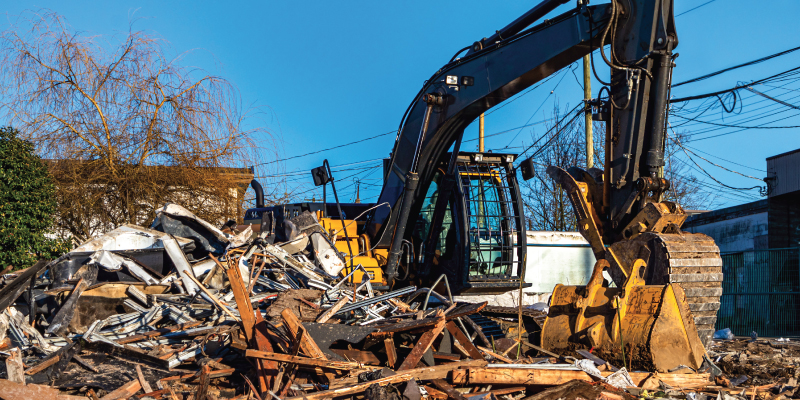
Demolition projects typically generate a variety of debris as structures are dismantled or removed. The specific types of debris can vary based on the materials used in construction and the scope of the demolition. It's important to note that proper handling and disposal of demolition debris are essential to minimize environmental impact and adhere to waste management regulations.
Many demolition debris materials can be recycled or salvaged, promoting sustainable practices in the construction and demolition industry. It's important to remember that local regulations and guidelines should be followed to ensure responsible debris management during residential demolition projects.
Some of the most common types of recyclable debris produced during a residential demolition project include:
Wood and Timber
Wood is a common construction material in residential buildings, used for framing, flooring, doors, and other components. During demolition, wooden structures and materials are often removed, leading to the generation of wood debris.
Wood can often be recycled or salvaged and used for reclaimed lumber, mulch, or biomass energy production.
Concrete and Masonry
Concrete and masonry materials, such as bricks and stones, are frequently encountered in residential and commercial structures. Demolition of walls, foundations, and other concrete elements results in the production of concrete and masonry debris.
Concrete and masonry materials can be recycled into aggregates for use in new construction projects. Salvaging bricks or stones for reuse is also common.
Metal
Residential buildings often contain metal components, including pipes, wiring, and structural elements. Metal debris is generated when these components are removed during demolition.
Metals such as steel, aluminum, and copper are highly recyclable. Scrap metal yards can process and recycle these materials.
Drywall and Plaster
Interior walls are commonly constructed using drywall or plaster. Demolition of these walls leads to the generation of debris consisting of gypsum-based drywall, plaster, and associated materials.
Drywall can be recycled into new drywall or used for soil amendment. Salvaging intact drywall sheets for reuse is less common but possible.
Roofing Materials
During demolition, roofing materials are removed, contributing to debris that may include shingles, tiles, or metal roofing components.
Asphalt shingles can often be recycled and used in the production of new asphalt. Metal roofing materials are highly recyclable, too.
Insulation
Residential and commercial structures usually incorporate insulation materials to regulate temperature.
Insulation materials, such as fiberglass, can be recycled. In some cases, salvaging and reusing insulation may be possible if it's in good condition.
Plastic and Vinyl
Various plastic and vinyl materials are commonly used in residential construction, including PVC pipes, siding, and window frames. These materials contribute to the generation of plastic and vinyl debris during demolition.
Plastics like PVC can be recycled, although the availability of recycling facilities for specific types may vary. Salvaging plastic fixtures for reuse is less common.
Asphalt
Driveways, walkways, and sometimes foundations are constructed with asphalt, and demolition activities can result in the production of asphalt debris.
Asphalt from driveways and walkways can often be recycled into new asphalt pavement or used for road construction.
Glass
Windows and glass doors in residential and commercial buildings contribute to the generation of glass debris during demolition, which may include broken glass panes and frames.
Glass from windows and doors is recyclable, and salvaging intact glass components for reuse is also possible.
Household Fixtures and Appliances
Demolition projects often involve the removal of fixtures and appliances such as sinks, toilets, bathtubs, kitchen cabinets, and appliances like stoves and refrigerators. These items can add to the overall debris generated, but in many cases, are salvageable.
Various household fixtures and appliances may contain recyclable materials. Scrap metal from appliances can be recycled, and some components like sinks or cabinets may be salvaged for reuse.
It's important to note that while many materials can be recycled, the feasibility and availability of recycling facilities can vary by location. Additionally, salvaging materials for reuse may depend on the condition of the items and the demand for reclaimed materials in the local market. Proper sorting and disposal practices are essential to maximize recycling and salvage opportunities during residential demolition projects. Consulting with local waste management authorities and recycling facilities can provide valuable information on the options available in a specific area.
Read on: How to Manage Remodel Debris and Dust
Advantages to Recycling and Salvaging Demolition Debris
-
Financial Benefits: Recycling and salvage operations can be economically viable, providing opportunities for businesses to profit from recovered materials. This creates a financial incentive for adopting sustainable practices in the demolition industry, fostering economic growth while promoting environmental stewardship.
-
Reducing Environmental Impact: Recycling and salvaging materials from demolition sites significantly reduce the environmental impact associated with waste disposal. Rather than sending tons of debris to landfills, these materials can be repurposed, minimizing the need for new resource extraction and lowering energy consumption.
-
Conserving Resources: Demolition sites often contain valuable resources, including metals, concrete, and wood, which can be extracted and reused in future construction projects. By salvaging these materials, the industry contributes to the conservation of natural resources, reducing the demand for virgin materials.
Keep reading: Eco-Friendly House Demolition: Sustainability in Deconstruction and Recycling
Find demolition contractors near me
Strategies for Maximizing Recycling and Salvage Opportunities
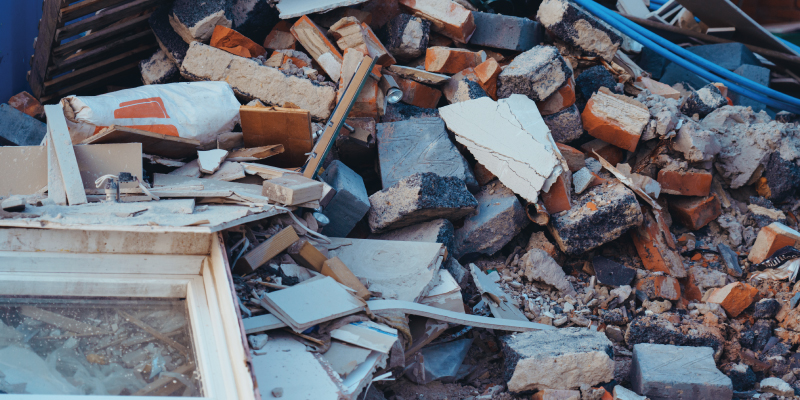
Pre-Demolition Assessment
Conducting a thorough pre-demolition assessment is crucial to identify materials that can be salvaged or recycled. This involves evaluating the condition of existing structures, determining the types of materials present, and developing a comprehensive plan for resource recovery.
Deconstruction vs. Demolition
Consideration should be given to deconstruction, a method that involves systematically dismantling a structure to salvage reusable materials. While deconstruction may be more time-consuming than traditional demolition, it offers greater opportunities for salvaging valuable materials and reduces overall waste.
Find out more: Deconstruction vs Demolition: When to Deconstruct a Building
Material Separation and Sorting
Implementing effective on-site material separation and sorting systems is essential. This involves categorizing materials such as concrete, steel, wood, and glass, ensuring that each type can be efficiently recycled or salvaged. This not only streamlines the recycling process but also enhances the quality of recovered materials.
Collaboration and Partnerships
Collaboration between demolition contractors, recycling facilities, and other stakeholders is crucial for maximizing recycling and salvage opportunities. Developing partnerships can facilitate the transportation and processing of recovered materials, creating a seamless flow from demolition sites to recycling centers.
Innovative Technologies
Embracing innovative technologies can enhance the efficiency of recycling and salvage operations. Advanced sorting systems, robotic demolition equipment, and mobile recycling units are examples of technologies that can streamline processes and improve the recovery of materials.
Case Studies in Sustainable Demolition
The Reclamation of Yankee Stadium
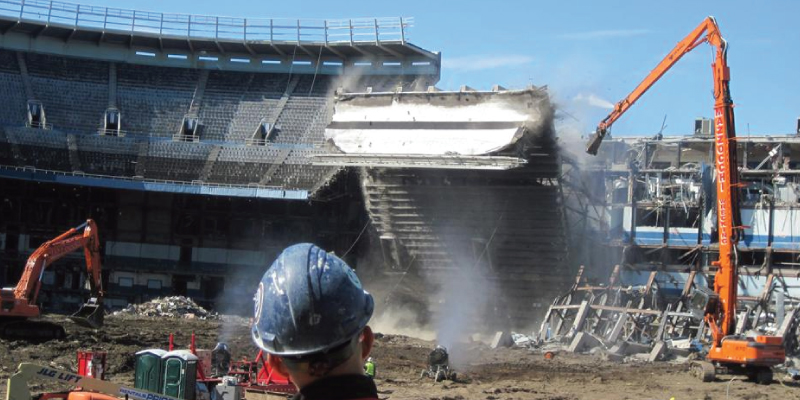
The demolition of the original Yankee Stadium in 2009 showcased a successful approach to salvaging materials. Nearly 95% of the demolished materials, including steel, concrete, and seats, were recycled or repurposed, highlighting the potential for sustainable practices in large-scale demolition projects.
The Rise of Deconstruction in Portland
Portland, Oregon, has been a pioneer in promoting deconstruction over traditional demolition. The city implemented policies encouraging deconstruction for certain structures, leading to increased salvage rates and the establishment of a thriving market for reclaimed building materials.
When you're ready to begin a demolition project, look no further than Hometown. We make it easy to find qualified local pros, request multiple free quotes, and compare companies to be sure you're hiring the best person for the job, who is experienced in salvaging materials.
